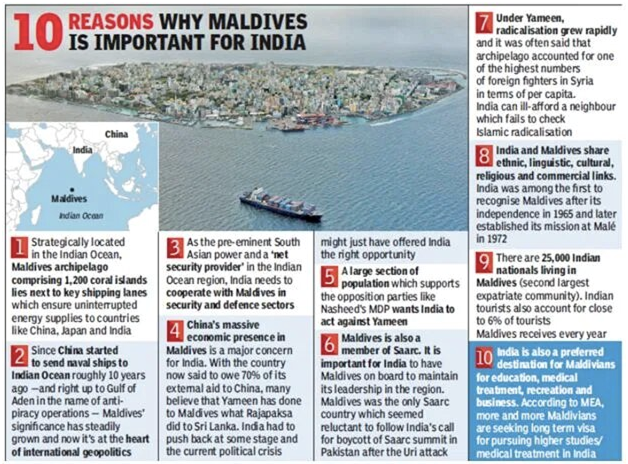6th India-Maldives Joint Staff Talks held in New Delhi to further bolster bilateral defence cooperation
Why in the News?
- Recently, 6th Joint Staff Talks (JST) between India and the Maldives were held in New Delhi on December 20, 2022.
- The meeting was conducted in a friendly, warm and extremely cordial atmosphere. Discussions focused on the ongoing and new initiatives under the ambit of existing bilateral defence cooperation mechanism of all the three services and further strengthening the engagements.
- The JST is a forum established to boost defence cooperation between India and the Maldives through annual talks at the strategic and operational levels between HQ IDS & MNDF.
Geo-Strategic Importance of Maldives to India
Maldives is one of the world’s most geographically dispersed countries, straddling a 960-km-long undersea ridge that runs north to south and creates a wall in the midst of the Indian Ocean, despite being the smallest country by land size in Asia. Beyond its physical size, the Maldives’ strategic location determines its geo-strategic importance, as shown by the following:
- Maldives, an Indian Ocean toll gate: The two crucial sea routes for connection are situated at the southern and northern ends of this island series (SLOCs).
- These SLOCs are essential for the flow of marine trade between the Strait of Malacca and the Gulfs of Aden and Hormuz in West Asia.
- While the Indian Ocean is considered as the key highway for global trade and energy flow, Maldives virtually stands as a toll gate.
- While SLOCs in the vicinity of the Maldives have broader strategic significance for global maritime trade, these are of vital importance for India since nearly 50% of India’s external trade and 80% of her energy imports transit these westward SLOCs in the Arabian Sea.
- Rising Marine Activity: As the Indian Ocean’s maritime economy has grown significantly in recent decades, so too has the region’s geopolitical struggle.
- China has therefore increased its presence in the Indian Ocean as a result of its strategic objectives there as well as its logistical constraints.
- India’s top strategic objective: India’s strategic aim must be realised in a favourable and advantageous marine environment in the Indian Ocean.
- India therefore works tirelessly to encourage an ever-expanding zone of peace and stability to surround it.
- Maldives is also a significant collaborator in India’s role as the Indian Ocean Region’s provider of internet security.
Cooperation Between India & Maldives
- Security Cooperation: Through the decades, India has rushed emergency assistance to the Maldives, whenever sought.
- As armed mercenaries attempted to overthrow President Maumoon Abdul Gayoom in 1988, India dispatched paratroopers and Navy ships to restore the legitimate government as part of Operation Cactus.
- Additionally, there have been collaborative naval drills in the Indian Ocean, and India continues to support the security of the maritime island.
- Disaster Management: The 2004 tsunami and the drinking water crisis in Male a decade later were other occasions when India rushed assistance.
- At the peak of the continuing COVID-19 disruption, the Maldives has been the biggest beneficiary of the Covid-19 assistance given by India among its all of India’s neighbouring countries.
- When the world supply chains were blocked because of the pandemic, India continued to provide crucial commodities to the Maldives under Mission SAGAR.
- People To People Contact: Technology has made connectivity easier for everyday contact and exchanges. Maldivian students attend educational institutions in India and patients fly here for superspeciality healthcare, aided by a liberal visa-free regime extended by India.
- Economic Cooperation: Tourism is the mainstay of Maldivian economy. The country is now a major tourist destination for some Indians and a job destination for others.
- Given the geographical limitations imposed on the Maldives, India has exempted the nation from export curbs on essential commodities.
Irritants in Relations
- Political Instability: India’s main concern has been how the political unrest in the neighbourhood will affect its development and security.
- The political turmoil that followed Mohamed Nasheed’s detention in February 2015 on terrorism-related charges has put India’s neighbourhood policy to a true diplomatic test.
- Radicalisation: The number of Maldivians drawn to terrorist organisations like the Islamic State (IS), madrassas in Pakistan, and jihadist organisations has risen over the past ten or so years.
- Islamist radicalism is on the rise in the island nation for a number of reasons, chief among them being political instability and socioeconomic uncertainty.
- The radicalization of the Maldives has also been influenced by events in Pakistan, Afghanistan, and West Asia.
- This raises the risk that terrorist organisations with a base in Pakistan could use distant Maldivian islands as a jumping off point for strikes against India and Indian interests.
- India is also concerned about the way that radical Islamist forces have been acquiring political clout in the area.
- China Angle: The strategic footprint of China in the region surrounding India has grown. A significant “pearl” in China’s “String of Pearls” strategy in South Asia has emerged as the Maldives.
- There are rumours that China may be attempting to establish strategic outposts in the archipelago due to its strategic location in the Indian Ocean.
- The dynamics of Sino-Indian relations are unpredictable, therefore China’s prospective strategic presence in the Maldives is still a source of concern.
- Additionally, the Maldives have begun negotiating with India using the China card.
- Conclusion
- As part of the government’s “Neighbourhood First” strategy, India continues to be a dedicated development partner for a secure, prosperous, and peaceful Maldives. However, Maldives should continue to its “India First” policy for the sake of maintaining a strategic level of comfort in relations.




